Donald Trump Doubles Down on Potential Strike Sites in Iran
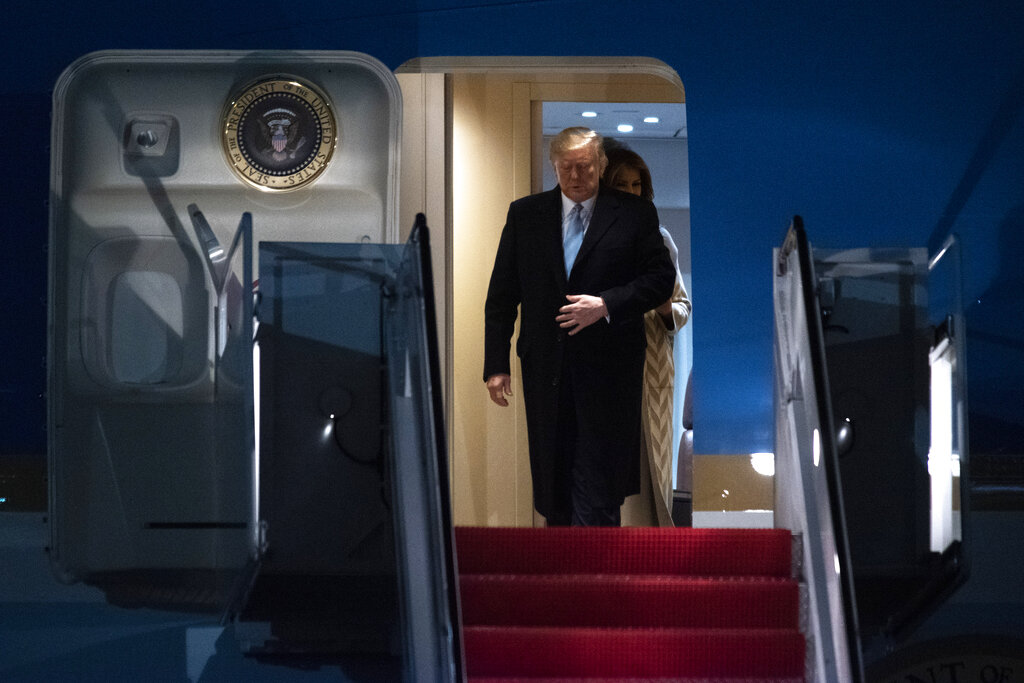
Donald Trump Says Iranian Cultural Sites are Fair Game.
No deal: Donald Trump, Kim Jong Un summit collapses over sanctions impasse

Talks between President Donald Trump and North Korea’s Kim Jong Un collapsed Thursday after the two sides failed to bridge a standoff over U.S. sanctions, a dispiriting end to high-stakes meetings meant to disarm a global nuclear threat. Trump blamed the breakdown on North Korea’s insistence that all the punishing sanctions the U.S. has imposed on Pyongyang be lifted without the North committing to eliminate its nuclear arsenal. “Sometimes you have to walk,” Trump explained at a closing news conference after the summit was abruptly cut short. He said there had been a proposed agreement that was “ready to be signed.” “I’d much rather do it right than do it fast,” Trump said. “We’re in position to do something very special.” Mere hours after both nations had seemed hopeful of a deal, the two leaders’ motorcades roared away from the downtown Hanoi summit site within minutes of each other, their lunch canceled and a signing ceremony scuttled. The president’s closing news conference was hurriedly moved up, and he departed for Washington more than two hours ahead of schedule. The disintegration of talks came after Trump and Kim had appeared to be ready to inch toward normalizing relations between their still technically warring nations and as the American leader dampened expectations that their negotiations would yield an agreement by North Korea to take concrete steps toward ending a nuclear program that Pyongyang likely sees as its strongest security guarantee. In something of a role reversal, Trump had deliberately ratcheted down some of the pressure on North Korea, abandoning his fiery rhetoric and declaring that he wanted the “right deal” over a rushed agreement. For his part, Kim, when asked whether he was ready to denuclearize, had said, “If I’m not willing to do that I won’t be here right now.” The breakdown denied Trump a much-needed triumph amid growing domestic turmoil back home, including congressional testimony this week by his former personal lawyer Michael Cohen, who called Trump a “racist” and “con man” and claimed prior knowledge that WikiLeaks would release emails that would damage Hillary Clinton’s campaign in 2016. North Korea’s state media made no immediate comment on the diplomatic impasse, and Kim remained in his locked-down hotel after leaving the summit venue. The North Korean leader was scheduled to meet with top Vietnamese leaders on Friday and leave Saturday on his armored train for the long return trip, through China, to North Korea. Trump insisted his relations with Kim remained warm, but he did not commit to having a third summit with the North Korean leader, saying a possible next meeting “may not be for a long time.” Though both he and Secretary of State Mike Pompeo said significant progress had been made in Hanoi, the two sides appeared to be galaxies apart on an agreement that would live up to U.S. stated goals. “Basically, they wanted the sanctions lifted in their entirety, and we couldn’t do that,” Trump told reporters. Kim, he explained, appeared willing to close his country’s main nuclear facility, the Yongbyon Nuclear Scientific Research Center, if the sanctions were lifted. But that would leave him with missiles, warheads and weapon systems, Pompeo said. There are also suspected hidden nuclear fuel production sites around the country. “We couldn’t quite get there today,” Pompeo said, minimizing what seemed to be a chasm between the two sides. Longstanding U.S. policy has insisted that U.S. sanctions on North Korea would not be lifted until that country committed to, if not concluded, complete, verifiable and irreversible denuclearization. Trump declined to restate that goal Thursday, insisting he wanted flexibility in talks with Kim. “I don’t want to put myself in that position from the standpoint of negotiation,” he said. White House aides stressed that Trump stood strong, and some observers evoked the 1987 Reykjavík summit between Ronald Reagan and the Soviet Union’s Mikhail Gorbachev, a meeting over nuclear weapons that ended without a deal but laid the groundwork for a future agreement. The failure in Hanoi laid bare a risk in Trump’s unpredictable negotiating style: Preferring one-on-one meetings with his foreign counterparts, his administration often eschews the staff-level work done in advance to assure a deal and envisions summits more as messaging opportunities than venues for hardline negotiation. There was disappointment and alarm in South Korea, whose liberal leader has been a leading orchestrator of the nuclear diplomacy and who needs a breakthrough to restart lucrative engagement projects with the impoverished North. Yonhap news agency said that the clock on the Korean Peninsula’s security situation has “turned back to zero” and diplomacy is now “at a crossroads.” The collapse was a dramatic turnaround from the optimism that surrounded the talks after the leaders’ dinner Wednesday and that had prompted the White House to list a signing ceremony on Trump’s official schedule for Thursday. The two leaders had seemed to find a point of agreement when Kim, who fielded questions from American journalists for the first time, was asked if the U.S. may open a liaison office in North Korea. Trump declared it “not a bad idea,” and Kim called it “welcomable.” Such an office would mark the first U.S. presence in North Korea and a significant grant to a country that has long been deliberately starved of international recognition. But questions persisted throughout the summit, including whether Kim was willing to make valuable concessions, what Trump would demand in the face of rising domestic turmoil and whether the meeting could yield far more concrete results than the leaders’ first summit, a meeting in Singapore less than a year ago that was long on dramatic imagery but short on tangible results. There had long been skepticism that Kim would be willing to give away the weapons his nation had spent decades developing and Pyongyang felt ensured its survival. But even after the summit ended, Trump praised Kim’s commitment to continue a moratorium on missile testing. Trump also said he believed the autocrat’s claim that he had nothing to do with the
Martha Roby: Strengthening our hand with Iran
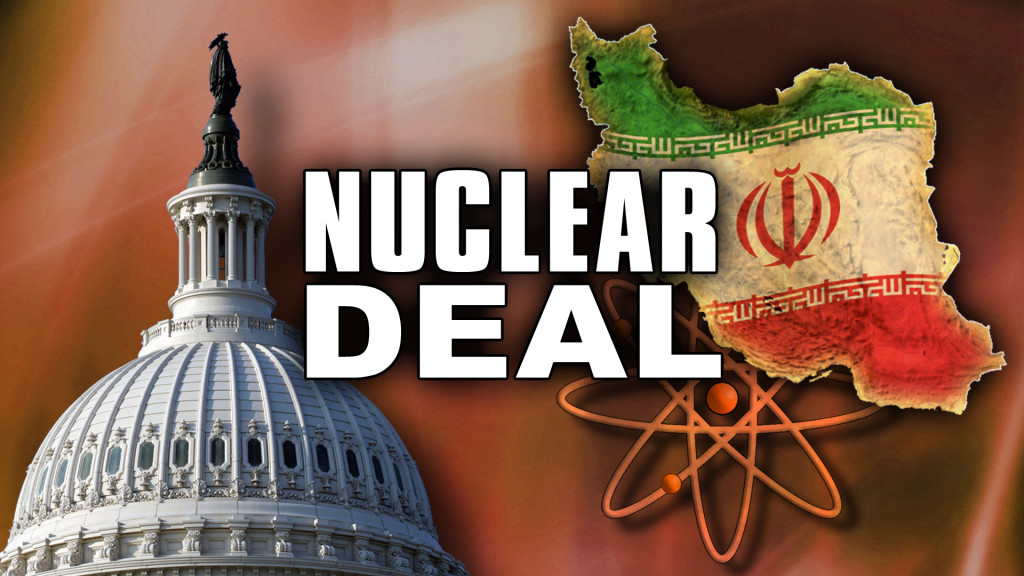
President Donald Trump recently announced he will withdraw the United States from the Iran Nuclear Agreement. From the very beginning, I said this was a flawed, weak deal that serves the interests of bad actors in Iran at the expense of our own. I support the Trump Administration’s efforts to ensure that we truly end Iran’s nuclear weapons program. After all, wasn’t that the point of this agreement in the first place? Under the deal, the Iranian regime was to dismantle their nuclear weapons program in exchange for the lifting of economic sanctions. Needless to say, this didn’t work out, and that’s largely because the Obama Administration failed to uphold the basic tenets they laid out for this agreement from the start. For example, when the previous Administration was negotiating this agreement more than three years ago, they originally said the United States would perform inspections on suspected Iranian nuclear facilities that could occur anywhere, at any time, to ensure that this rogue regime wouldn’t be able to quietly continue their efforts to develop a nuclear weapon. In reality, the Iranians ended up having up to 24 days’ notice in many cases before inspections were allowed to occur. Even then, Americans were prohibited from unilaterally performing them. This is just one example of the many ways the Iran deal fell far short of accomplishing what the Obama Administration promised Congress and the American people. Iran is the leading state sponsor of terrorism, and that hasn’t changed over the last three years. While actively supporting terrorist groups like Hezbollah and Hamas, the nation has been part of horrific terrorism in Yemen, Syria, and Lebanon. The regime has also been developing long-range ballistic missiles. Their ballistic missiles program threatens Israel, our allies in the region, and even U.S. forces. It is no secret that Iran has not stopped its mission to obtain a nuclear weapon, and Israeli intelligence actually proved Iran deceived negotiators from the outset by covering up their nuclear weapons program prior to signing the agreement in 2015. So now, the regime has the best of both worlds: relief from economic sanctions and the freedom to continue their nuclear weapons program without consequence. For starters, I believe it is imperative that we reinstate the economic sanctions against Iran that were in place prior to the Obama-era nuclear agreement. In the House, I have supported policies like this that strengthen our hand towards Iran, including the Iran Sanctions Extension Act, which Congress passed in 2016 to reauthorize for ten years the economic penalties used by the United States to deter Iran from furthering developing ballistic missiles and supporting terrorism. Clearly, there is great room for improvement in our dealings with this rogue nation. As I have said many times before, the Obama Administration’s behavior towards Iran was truly baffling, and I am glad that we have now reversed course. I am hopeful that the Trump Administration can strengthen our hand with Iran after eight years of it being severely weakened. At the end of the day, the bottom line is that Iran’s nuclear weapons program, support for terrorist organizations, and development of ballistic missiles pose a direct threat to the United States and our allies. We must take this very seriously throughout future negotiations with this regime. To do otherwise compromises our own national security. ••• Martha Roby represents Alabama’s Second Congressional District. She lives in Montgomery, Alabama, with her husband Riley and their two children.
Slow-moving White House brings new Russia sanctions a step closer
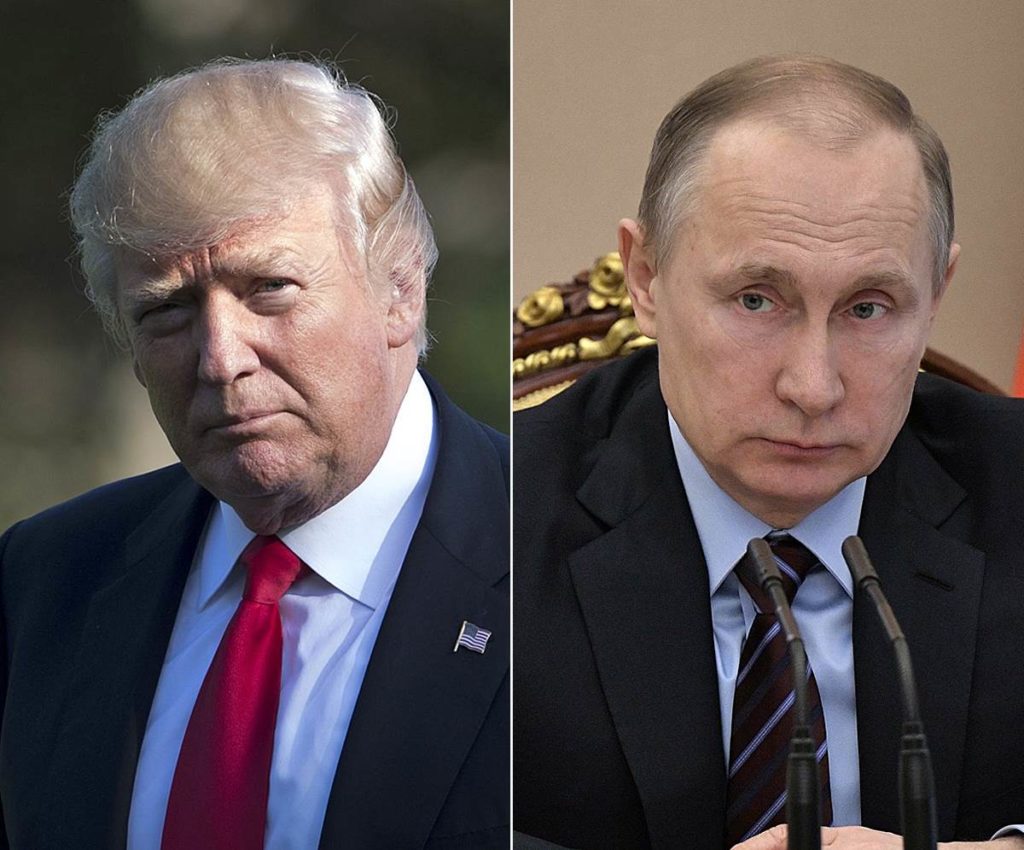
The Trump administration has given Congress a list of Russian officials who may soon become off-limits to anyone who wants to avoid U.S. sanctions, as criticism mounted over the administration’s tardy execution of new penalties on Moscow. Anders Fogh Rasmussen, the former NATO chief and adviser to Ukraine’s leader, said Russian President Vladimir Putin “must be laughing right now” at how successfully he’s undermined Western democracy. He said the lack of answers from the Trump administration would be seen as a sign of weakness that Putin would exploit. “He’s achieved much more than he could have ever dreamed of when it comes to undermining the credibility of Western democratic institutions,” Rasmussen said Thursday in an Associated Press interview. “When he’s watching the ongoing discussion here in Washington, I think it’s unbelievable for him that he could achieve that much for a very modest investment in whatever he might have invested in interference in the election or whatever.” The former prime minister of Denmark, Rasmussen joined a growing chorus of Russia critics expressing exasperation that an Oct. 1 deadline came and went without new penalties to punish Russia for interfering in the U.S. election. A law Trump signed in August requires the administration to produce a list of individuals linked to Russia’s defense and intelligence agencies. Anyone who does business with those individuals could then be hit themselves with U.S. sanctions. With pressure building, Secretary of State Rex Tillerson approved the belated list and authorized its release, State Department spokeswoman Heather Nauert said. Tillerson’s deputy spoke Thursday to Republican Sen. Bob Corker, the Senate Foreign Relations Committee chairman and among those seeking an explanation for the delay. The State Department was also sending others in Congress the list of individuals, along with guidance about how businesses and foreign countries can avoid running afoul of the sanctions, officials said. Tillerson has said one reason for the delay has been concern about how the sanctions may affect business and major U.S. allies who do business with Russia’s defense and intelligence sectors. Turkey, a NATO ally, has a deal with the Kremlin to buy the S-400, Russia’s most advanced air defense missile system. And key security partner Saudi Arabia recently struck an array of deals with Moscow, including contracts for Russian weapons. Although the list has not yet been made public, it’s expected to be released more broadly in the coming days, giving businesses and nations a chance to wind down transactions with the off-limits individuals and entities. A three-month grace period will expire on Jan. 28, Nauert said. Many of the Russian officials have previously been targeted by U.S. sanctions, said individuals familiar with the list given to Congress. These individuals weren’t authorized to discuss it publicly and requested anonymity. The new, congressionally required sanctions were in addition to existing U.S. penalties on Russia for its support of separatists in eastern Ukraine and 2014 annexation of Ukraine’s Crimea region. In a letter to Trump this week, 20 Democratic lawmakers said the administration had done “nothing to hold Russia accountable” for interfering in the 2016 election. “This inaction is baffling and unacceptable. It allows Russia or any other hostile actor to believe they can attack American democracy with impunity,” said New York Rep. Eliot Engel and the other Democrats. In the Senate, the chairman of the Armed Services Committee, John McCain of Arizona, and the top Democrat on the Foreign Relations Committee, Ben Cardin of Maryland, called the administration’s announcement “a step in the right direction.” “We are encouraged that the sanctions list includes many targets from the Russian defense and intelligence sectors that Congress previously identified and look forward to more closely reviewing the list to ensure that it is comprehensive,” they said in a joint statement. U.S. officials have also cited legal hurdles to getting the sanctions in place. But Rasmussen said the lack of clear communication from the administration was muddying the intended U.S. message that Russian aggression and interference won’t be tolerated. “If there are such legal complications, the administration should as soon as possible engage with Congress to solve those problems, at least inform Congress about those obstacles,” Rasmussen said. “Otherwise, the administration will leave the suspicion it’s because of a hesitation.” Rasmussen, who began advising Ukrainian President Petro Poroshenko earlier this year, called for the U.S. to provide lethal, defensive weaponry to Ukraine’s forces. That move has been under consideration for years, including under President Barack Obama. The U.S. has not yet taken the step despite floating the possibility publicly on several occasions. “So far, nothing has happened from the administration side,” Rasmussen said. Still, he said that just the threat of U.S. weapons potentially flowing to the Ukrainians had affected Putin’s deliberations about Ukraine in a positive way. He said he believed Putin’s recent proposal to send U.N. peacekeepers to eastern Ukraine reflected the Russian leader’s “attempt to find a way out of all of this.” Republished with permission from the Associated Press.
Russia warns against new sanctions on North Korea
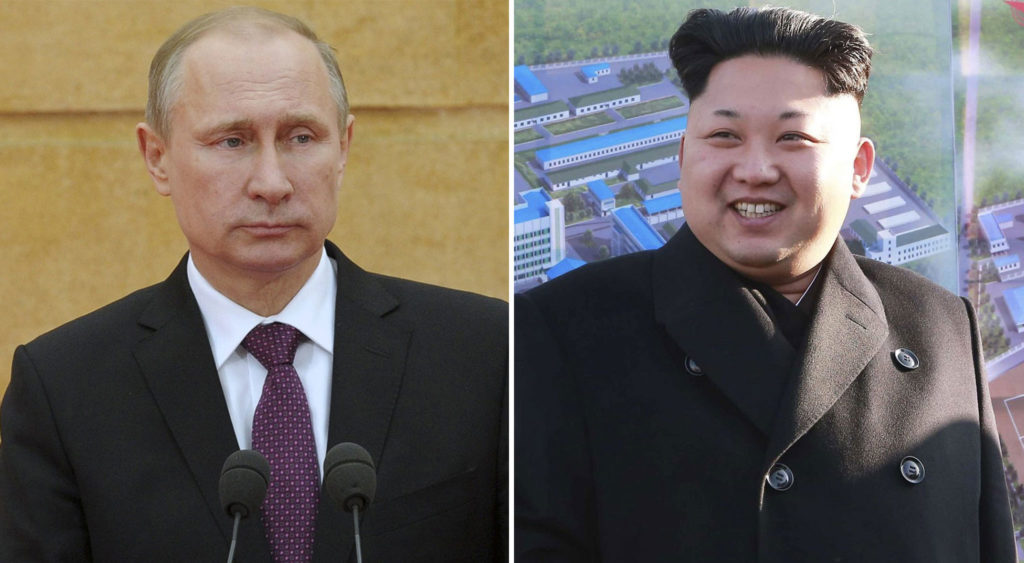
A senior Russian diplomat is warning against expanding sanctions against North Korea, saying it’s necessary to focus on a political settlement. Deputy Foreign Minister Sergei Ryabkov said that “the scope of sanctions already endorsed by the U.N. Security Council is such that any possibilities of expanding such measures have been exhausted.” In remarks to the Japanese and Chinese media released by the ministry on Wednesday, he bemoaned Washington’s “absolute and boundless” emphasis on developing new sanctions against Pyongyang. Ryabkov said the U.N. Security Council must now focus on a political settlement. China and Russia have called on the U.S. to suspend annual military exercises with South Korea in exchange for Pyongyang halting its missile and nuclear tests as a first step toward direct talks. Republished with permission of The Associated Press.
White House criticizes Russia sanctions stalled in House
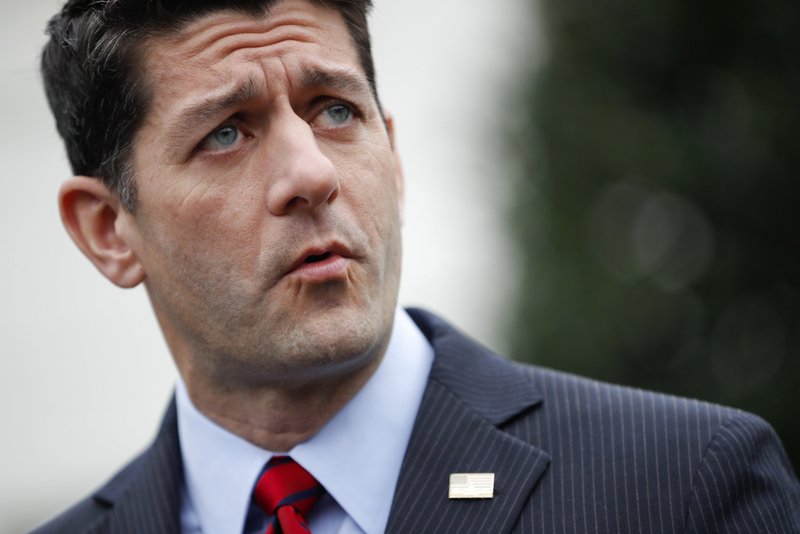
A new package of economic sanctions on Russia and Iran unacceptably constrains the president’s authority, the White House says, as Democrats complain that the Trump administration is trying to weaken the penalties. The legislation sailed through the Senate nearly a month ago in response to Russia’s meddling in the 2016 presidential election and its belligerence toward Ukraine. But the bill stalled in the House with Democrats and Republicans blaming each other for the delay. Marc Short, the White House legislative director, told reporters that the administration backs the new sanctions on Russia and Iran. But he appeared to object to a key part of the legislation that would give Capitol Hill a much stronger hand in determining Russia sanctions policy. The bill would require a congressional review if President Donald Trump attempted to ease or end penalties against Moscow. “Our concern is that the legislation, we believe, sets an unusual precedent of delegating foreign policy to 535 members of Congress by not including certain national security waivers that have always been consistently part of sanctions bills in the past,” Short said. Following his lengthy meeting on Friday with Russian President Vladimir Putin in Germany, Trump said he wants to move forward “working constructively with Russia” Officials from the Treasury and State departments met last week with House congressional staff to voice their concerns over the congressional review section of the bill. The officials said the provision would infringe on the president’s executive authority, according to an aide knowledgeable of the discussions. But weakening that provision substantially could provoke resistance from Republicans and Democrats. Sen. Bob Corker of Tennessee, the Republican chairman of the Foreign Relations Committee, heralded the review requirement as the proper exercise of congressional authority. Corker told reporters Monday that it’s not unusual for a White House to resist oversight of foreign policy. But he said the sanctions review requirement is a “very important” part of the legislation. “Any administration would prefer to conduct foreign policy 100 percent without involvement from Congress,” Corker said. But no Trump administration official has contacted him to say “we don’t want this legislation to pass. That has never occurred,” he said. Trump tweeted Sunday that sanctions against Russia were not discussed at his meeting with Putin. But White House spokeswoman Sarah Huckabee Sanders contradicted Trump, telling reporters Monday that “sanctions specific to election-meddling were discussed” in the meeting. Ashley Etienne, a spokeswoman for House Minority Leader Nancy Pelosi, said that Democrats have been demanding for weeks, to no avail, that the House Republican leadership bring the sanctions bill to the floor for a vote. “While Putin and President Trump meet privately, the American people are left to ask why Republicans are more concerned with Russia’s interests than the integrity of our democracy,” she said. A key sticking point for Democrats is a proposed technical change to the bill made late last month by the Senate that Democratic aides said Monday would prevent rank-and-file House members from being able to challenge a president’s decision to lift or ease the sanctions against Russia. But AshLee Strong, a spokeswoman for House Speaker Paul Ryan, blamed House Democrats for holding up the bill unnecessarily. She said House Republicans are fully prepared to coordinate with the Senate and move the bill forward, “but House Democrats are blocking that and demanding their own changes to the bill.” Separately, a Republican aide said House leaders were confident the sanctions package would be approved before Congress leaves for the August recess. The Republican and Democratic aides were not authorized to speak publicly and requested anonymity to discuss private talks. While Congress was on its weeklong July 4 recess, a new wrinkle developed that could make approval of the legislation more difficult. The national trade association representing oil and gas companies said the bill could harm U.S. energy companies while strengthening the hand of Russian businesses. The American Petroleum Institute said late last week that the bill would expand a prohibition on U.S. energy companies from being involved in oil projects located in Russia to projects around the world that include Russian energy firms. In trying to punish Moscow, the group said, the bill could instead penalize major American business, potentially costing billions of dollars in jobs and economic activity. Secretary of State Rex Tillerson, the former CEO of Exxon Mobil, has declined to endorse the sanctions legislation. He said during congressional testimony that Trump needs to have “the flexibility to adjust sanctions to meet the needs of what is always an evolving diplomatic situation” with Russia. The legislation cleared the Senate two weeks ago with 98 votes, an overwhelming margin that suggested the bill would speed quickly through the House and to Trump’s desk. But progress on the measure slowed almost immediately. House Republican leaders said the bill ran afoul of a constitutional requirement that legislation involving revenue start in the House. The necessary repairs were made, according to Corker, and approved by the Senate in late June. Republished with permission of The Associated Press.
What exactly is US Syria policy? Big questions for allies
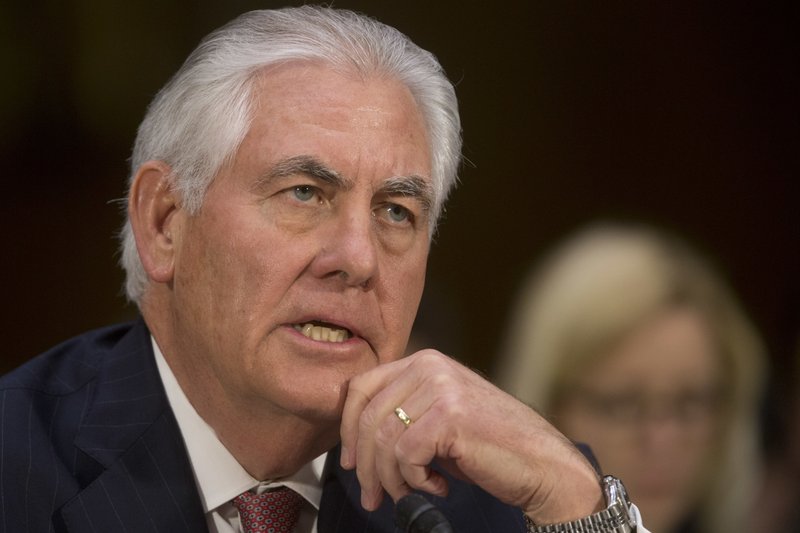
Seeking support from abroad, the U.S. struggled Monday to explain a hazy Syria strategy that has yet to clarify key questions: whether President Bashar Assad must go, how displaced Syrians will be protected and when America might feel compelled to take further action. Successive attempts by top Trump administration officials to articulate a plan have only furthered the appearance of a policy still evolving, even after the U.S. broke with precedent last week by attacking Assad’s forces. In the absence of answers, other countries seem to be moving ahead on their own terms. British Foreign Secretary Boris Johnson, after a meeting in Italy with U.S. Secretary of State Rex Tillerson, floated the possibility of new sanctions on both the Syrian and Russian militaries, an idea the U.S. has only briefly mentioned. In an unusual announcement for a foreign government, Johnson also said the U.S. could launch more cruise missiles into Syria like the ones President Donald Trump ordered last week in reaction to Assad’s use of chemical weapons. “Crucially, they could do so again,” Johnson said. Tillerson himself raised fresh expectations for aggressive U.S. action — and not only in Syria — as he visited Sant’Anna di Stazzema, a Tuscan village where the Nazis massacred more than 500 civilians during World War II. As he laid a wreath, he alluded to the Syria chemical attack. “We rededicate ourselves to holding to account any and all who commit crimes against the innocents anywhere in the world,” Tillerson said. Though such comments hint at a more activist U.S. foreign policy focused on preventing humanitarian atrocities, Trump has consistently suggested he prefers the opposite approach. His young administration has generally downplayed human rights concerns while promoting an “America First” strategy de-emphasizing the concerns of foreign nations. The uncertain view of U.S. objectives prevailed as Tillerson planned to attend a meeting Tuesday of the “likemindeds” — countries that share a similar approach to resolving Syria’s protracted civil war. The session on the sidelines of the Group of 7 summit in Italy was to include Middle East countries, including Turkey, Saudi Arabia, Jordan and the United Arab Emirates, that share a U.S. interest in resolving the conflict and resisting Iran’s influence in Syria. Tuesday night, Tillerson will fly to Moscow, the first official visit by a Trump Cabinet official to Russia, Assad’s strongest ally. The U.S. has said its Syria strategy centers on persuading President Vladimir Putin to stop supporting Assad. On Monday, the U.S. upped the stakes significantly by accusing Russia of knowing in advance of the chemical attack and using a Russian-operated drone to help cover it up. No component of Trump’s Syria policy has engendered more confusion than Assad’s future — an issue that similarly befuddled the Obama administration, whose once-adamant position that Assad must go softened substantially by the time President Barack Obama left office in January. Leading up to the U.S. missile attack, Trump’s administration had said Assad’s future was up to the Syrian people. Then Trump, the day after the assault, said his thinking about Assad had changed. Tillerson answered a question about effecting regime change by saying the U.S. was organizing a coalition to do just that. Yet after Trump’s retaliatory strike, the position became less clear. Some officials, like Tillerson, said the U.S. was confident Syrians would choose on their own to push Assad aside, while suggesting the U.S. wouldn’t mandate it. U.N. Ambassador Nikki Haley and others said ousting Assad was indeed a U.S. goal, but only one of several. Another unanswered question: Did Trump’s strike set a precedent that any chemical attack will trigger a U.S. response? At the White House, spokesman Sean Spicer insisted that Trump wouldn’t box himself in by disclosing his actions in advance. But he added further uncertainty to the equation by saying that even barrel bombs — which Assad has used with frequency — would necessitate U.S. action. “If you gas a baby, if you put a barrel bomb in to innocent people, I think you will see a response from this president,” Spicer said. Minutes later, the White House rushed to clarify that Spicer wasn’t announcing any new policy on barrel bombs. “Nothing has changed in our posture,” a White House official said in a written statement. On one point, the administration has been consistent: Defeating the Islamic State group in Syria is the first priority. There’s less certainty about what comes now. Tillerson and other officials have said the next priority is to create “zones of stability” in Syria where those displaced by civil war can live without fear of violence. They say that entails negotiating cease-fires between Assad’s government and rebels, who have been fighting both IS and Assad. With stability restored, they say, conditions will be ripe for a U.N.-brokered political transition. Yet it’s unclear why rebel groups would agree to cease-fires with Assad, who would protect the zones, and how. Assad’s willingness to clear the way for political talks predicated on him leaving power is deeply in question. Republished with permission of The Associated Press.
US poised to announce response to Russia’s election hacking
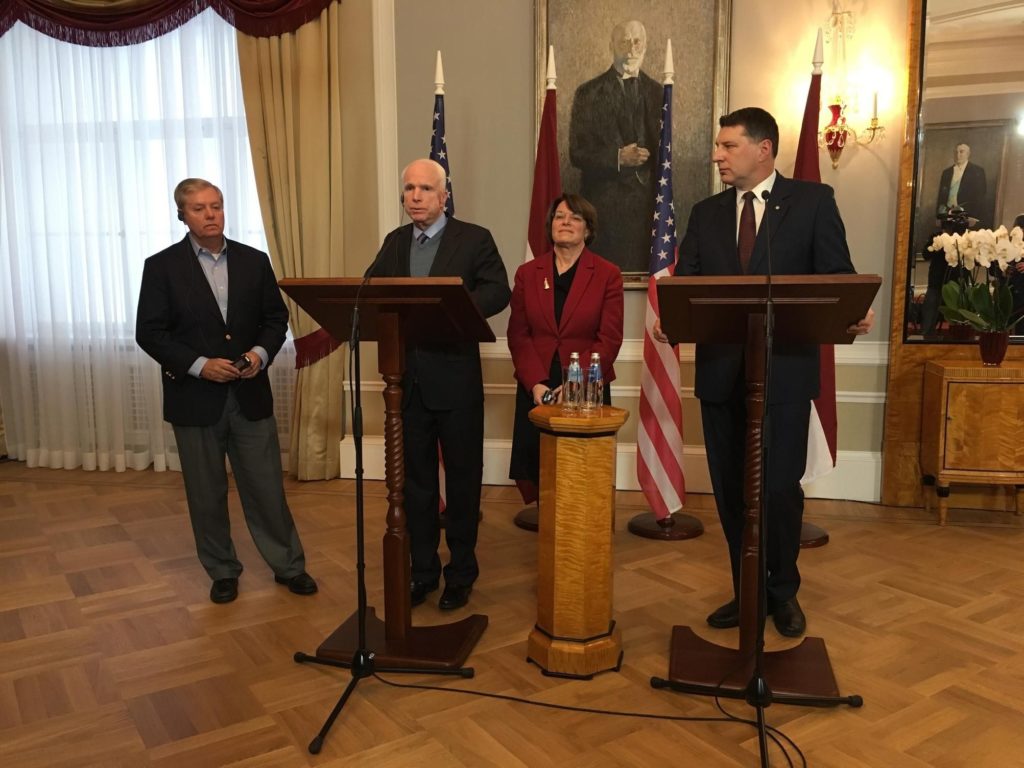
U.S. officials are expected to announce an imminent response, including sanctions, on Thursday for Russia’s interference in the U.S. presidential election by hacking American political sites and email accounts – an effort that ensures action before President-elect Donald Trump takes office. Sanctions against Russia or its government officials would tighten the economic screws on an already heavily sanctioned country and could also further aggravate tensions between Moscow and Washington. The move also would put Trump in the position of having to decide whether to roll back the measures once in office and could potentially cause difficulties for his nominees during their confirmation hearings in the Senate, where support for sanctioning Russia is strong. “We have to sanction Russia for these cyberattacks (and) send a clear message to the incoming administration that there is a lot of bipartisan support in Congress for going after this,” Sen. Amy Klobuchar, D-Minn., told The Associated Press by phone from Latvia while on a trip to discuss security issues, including cybersecurity, with eastern European allies. She said lawmakers on both sides of the aisle were in favor of quick action. Klobuchar joined Sens. John McCain, R-Ariz., and Lindsey Graham, R-S.C., in their visits to the Baltic states, Ukraine and Georgia – all Russian neighbors – as well as Montenegro. Russia responded angrily in anticipation of the announcement and suggested it might retaliate against American diplomats. Russian Foreign Ministry spokeswoman Maria Zakharova called it a last blow by President Barack Obama to U.S.-Russia relations and added, “We are tired of lies about Russian hackers that continue to be spread in the United States from the very top.” “If Washington takes new hostile steps, it will receive an answer,” Zakharova said in a statement. “This applies to any actions against Russian diplomatic missions in the United States, which will immediately backfire at U.S. diplomats in Russia.” Russian officials have denied the Obama administration’s accusation that the Russian government was involved at the highest levels in trying to influence the U.S. presidential election. U.S. intelligence agencies concluded that Russia’s goal was to help Trump win – an assessment Trump has dismissed as ridiculous. The Obama administration is expected to announce action by the White House and the State and Treasury departments in response to Russian meddling in the presidential campaign, a U.S. official said. Additional sanctions are expected against Russian individuals or entities suspected of playing a role in Russia’s alleged effort to sow discord in the U.S. election, according to the official, who did not have the authority to disclose the information and spoke on condition of anonymity. Obama is expected to issue an executive order Thursday that lays out the various dimensions of the response, the official said. Russian diplomatic activities also are expected to be targeted, the official said. The lawmakers on Wednesday reaffirmed the U.S. commitment to the Baltics, saying the relationship with the three former Soviet states – Estonia, Latvia and Lithuania – “will not change” under the new administration. “I predict there will be bipartisan sanctions coming that will hit Russia hard, particularly (President Vladimir) Putin as an individual,” Graham told reporters in Riga, the Latvian capital. He didn’t elaborate on possible sanctions. The U.S. has already sanctioned Russia over its annexation of Crimea and the conflict in Ukraine, but it could do more through the use of an April 2015 executive order allowing for the use of sanctions to combat cyberattacks. A year after the order was issued, Democratic Party officials learned their systems were attacked after discovering malicious software on their computers. But the executive order isn’t well suited to the Russian activities, said Stewart Baker, a partner specializing in cybersecurity for Steptoe & Johnson LLP. Baker said that order was primarily aimed at cyberespionage, such as spying by the Chinese military for commercial advantage. And additional sanctions may also escalate the conflict between the two countries, Baker said. The 2015 order covers a response to attacks on critical infrastructure, and Klobuchar called on the administration to amend it to include election systems. A presidential policy directive in 2013 identified 16 sectors that are considered critical infrastructure, including energy, financial services and health care. The U.S. Homeland Security Department is considering adding election systems to that list. The designation places responsibilities on the secretary of homeland security to conduct comprehensive assessments of vulnerabilities and track as well as provide information on emerging and imminent threats that may affect critical infrastructure. More important, in this case, the designation would allow for the first use of the 2015 executive order in response to a cyberattack against election systems. And while Trump could reverse any amended or new order allowing for the U.S. to impose sanctions on entities involved in a cyberattack on election systems, “he would have a lot of explaining to do,” Klobuchar said. “The executive order gives tools to respond.” Speaking to journalists at his Palm Beach, Florida, estate on Wednesday, Trump was not addressing the issue of sanctions, but said: “We don’t have the kind of security we need.” He added: “Nobody knows what’s going on.” Trump said he has not spoken with senators calling for sanctions, but believes “we have to get on with our lives.” Obama has ordered intelligence officials to conduct a broad review of the election-season cyberattacks to be completed before he leaves office. Russia’s neighbors have long suffered the wrath of its hackers, whose actions have frequently complemented Moscow’s political and military aims. In 2014, Ukraine’s Central Election Commission was targeted by a pro-Russian hacking group. Republished with permission of the Associated Press.


